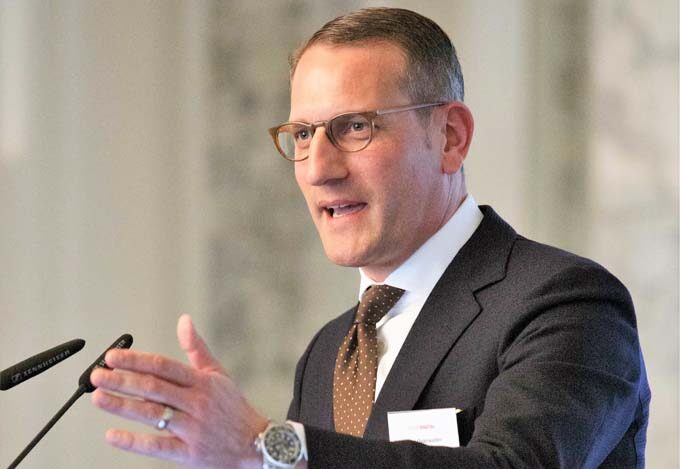Artificial Intelligence vs. Humans - Who Wins?
Various aspects and perspectives on Artificial Intelligence (AI) dominated the 4th Digital Economic Forum 2018 (DEF) at the Park Hyatt in Zurich. The expert audience received a wide range of approaches to artificial intelligence (AI) and its potential for future applications from experienced speakers.

The new DEF organizer Thomas Zwahlen made a small paradigm shift: While the events of the previous years lived strongly from the prominence of speakers, the event should in the future increasingly focus on the effects of digitization on people. On April 24, the audience got a first - quite successful - taste of this. The presentations focused on the effects of artificial intelligence on various areas of life and industries.
The audience was welcomed by Carmen Walker Späh, member of the Zurich government and Director of Economic Affairs. She pointed out that Zurich has developed into a leading ICT location. Industry 4.0 demands enormous pressure to adapt for all players, said Carmen Walker Späh. However, she added, there is also a need for a 4.0 policy that does not stifle innovation through the regulatory mode. Stephan Sigrist, the head of the think tank W.I.R.E and co-author of the study "Future Digital Switzerland," called for a new approach to dealing with the unknown digital future, a differentiated perspective beyond the common myths. Digitalization is the norm today. The focus of innovation, however, must be on people and society, he said. "Switch off the computer - switch on the brain," was his message, because technology alone will not be able to fix it.
Switzerland's leadership role for AI
Lukas Sieber, Co-Founder of Mindfire & Executive Director North America Greater Zurich Area (GZA), found that the world got "high" on blockchain and crypto in the last couple of years. However, he said, one should not be blinded; most of it is "junk." Together with his co-founder Pascal Kaufmann, Sieber presented the just published white paper of Mindfire, a non-profit project that aims to decode the human brain with the 100 smartest people in the coming years. Mindfire was founded so that Switzerland could take the lead in the field of AI and not leave the development to private individuals or companies. The results of the project should also be generally available and corresponding licenses for the innovative inputs of the participants refinanced via IOC (blockchain/tokens) in a value-creating way.
Matthias Plattner, Head Technology & Platform Innovation - Global Financial Intermediaries UBS AG, reckoned that the banking business will be heavily dependent on so-called "augmented" technologies in the future. He said that the risks must be understood and the opportunities exploited accordingly in order to be able to advise people comprehensively and, above all, with confidence. The topic of trust was then taken up by Karsten Stampa, COO/CFO Healthbank Innovation AG: "Without trust, a lot of potential in digital health is wasted," Stampa explained. Digital health could bring an incredible number of benefits based on "live data of real live." However, we need to move away from closed systems and strengthen data protection for the user himself, then trust will also work out.
Beware of the Darknet and 007!
Hans Ulrik Staehr, Founder MarketScape, Denmark and Co-founder Munit.io, gave an impressive insight into illegal processes and business (drugs, weapons, cybercrime) in the hidden Darknet with a combination of Crypto assets and the TOR browser. Darknet, he said, is a threat but also an opportunity to identify criminal processes and criminal psychology. In an effective presentation, profiler Suzanne Grieger-Langer laid out how to find the 007 types and avoid the 08.15 types. The most important resource today is knowledge. Communication and cooperation on a higher level is digital today. The (00)7 skills of orientation; decision; focus; discipline; mindfulness; fitting and individuality make up the "Homo Deus", the leadership personality.
Andrew Garrihy, Chief Marketing Officer Consumer Business, Western Europe of Chinese technology company Huawei introduced his company and what understanding of Artificial Intelligence (AI) it has. "We believe that AI should serve humanity," Andrew Garrihy explained. It should help amplify the potential of the human brain. "At some point, machines will overtake us in a materialistic sense," predicted Prof. Joachim Buhmann of ETH Zurich (see also the report in ORGANISATOR 4-2018). The goal is self-learning algorithms that explore reality. Patrick Schraut, Vice President Consulting Europe at NTT Security, saw IT security on its way from a niche existence to becoming a business driver and part of a company's value chain. It is thus becoming a competitive advantage and success factor at the same time.
Artificial neural networks are changing the world
The Deep Learning Engineer from NVIDIA LTD, Adam Grzywaczewski impressed the audience with his presentation on "Demystifying Artificial Intelligence". Due to ever increasing amounts of data, eminently improved computer performances and their networking, artificial neural networks with high application potential are possible today. Examples are autonomous vehicles, better detection of diseases or smart robots, Grzywaczewski explained. These artificial neural networks would change the economy and society. In contrast, Thomas Asger Hansen, senior manager, Big Data, AI & IoT Lab, Grundfos A/S, estimated that AI should be used to enhance human performance and must be implemented through an "intelligent system" that orchestrates a variety of paradigms rather than relying on a single paradigm. "Our vision is to simplify and automate maintenance as much as possible - even for complex systems - so that even non-professionals can perform a number of complex tasks safely," Hansen explained.









